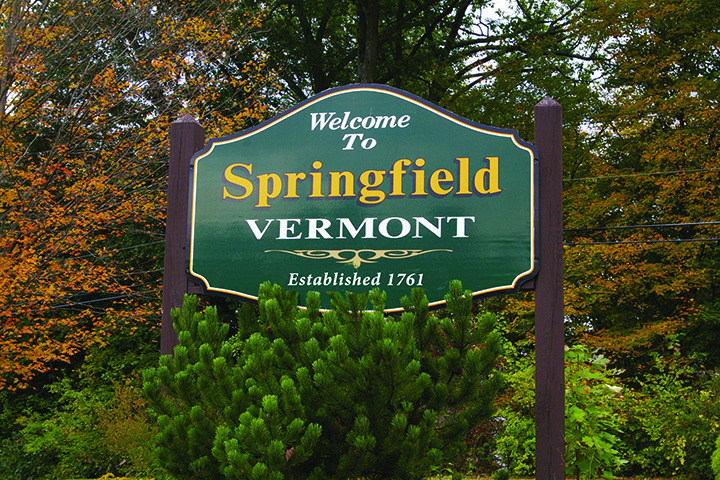SPRINGFIELD, Vt. – On Monday, Oct. 14, the Springfield Selectboard held a public hearing to gather feedback from residents regarding the proposed ordinance change designating a portion of Wall Street as one-way.
Selectboard Vice Chair Michael Martin introduced the proposal, reminding everyone of why the idea was originally suggested. “The town began working on repairing the sidewalks along Wall Street, and it became clear that the road was not sufficient for two-way traffic,” Martin stated. “As a result, a determination was made that the portion of Wall Street between Summer Street and Reed Street be designated as one-way. Public Works recommends that the one-way traffic on Wall Street go from Summer Street to Reed Street due to maintenance concerns.”
The board also took the opportunity to correct some errors and omissions in the existing ordinance.

Board Chair Kristi Morris opened the hearing up to public comments, prompting Springfield resident Dan Keebler to tell the board that he has lived on that section of Wall Street since 1978. Keebler felt the change had not been clearly attributed and was not supported by most residents, and cited a list of concerns. He wanted to hear how the one-way traffic proposal would impact the real estate value of the homes in that area. He asked how the switch will affect emergency services, delivery services, trash and snow removal services, and wondered why the town had not been called to vote on the question. Keebler concluded, “I ask that you do not include Wall Street in this ordinance.”
Fellow Wall Street resident Tanya Kell spoke up to thank Keebler for being so “eloquent and thorough,” and stated that she agreed with him 100%.
Kevin Malloy, another Wall Street homeowner, said he would be for the one-way traffic proposal for safety reasons, but also that he would be open to discussing other alternatives. He reported that the road in front of his house is very narrow, and he had seen many “close calls,” especially involving larger vehicles.
Malloy further remarked, “I don’t think enough outreach was done to the residents or property owners.” He mentioned he was only attending the hearing because he’d heard about it from a neighbor.
Town manager Jeff Mobus addressed the citizens’ comments. “When this first started,” Mobus said, “one of the neighbors was very concerned because she [lived] right in the middle of that narrow stretch.” Mobus explained that in that area, the road is 15-16 feet wide, and the standard for the state is 11-12 feet per direction, plus 5 feet for sidewalks.
During the sidewalk repair project, a damaged railing was revealed, and the embankment and retaining wall were found to be crumbling and in need of restoration. Mobus explained that limiting the road to one-direction traffic allows for the space to make the needed repairs, increases safety, and would potentially save money for the town. “If the board and the residents want to keep it two lanes, that’s fine,” Mobus remarked. “[But] we will have fewer options to do the repairs to the sidewalk and the wall.”
Morris thanked everyone for their participation, and said the board would take all points made into consideration moving forward.
The regular selectboard meeting commenced, and the first agenda item was presented by Adam Goudreau, VTrans project manager, asking the board for a decision on the realignment of the Toonerville Trail at Exit 7. VTrans had initially approached the board in May 2023 with several alternatives, and after some review, narrowed that down to two. The first is a 250-foot-long tunnel constructed on the existing trail alignment, and the second would relocate the trail along U.S. Route 5/Vermont Route 11, offset with a 5-foot esplanade, crossing below Interstate 91 at Bridge 28.
Goudreau outlined the project proposals, revisited previous alternatives, and after hearing from the board and several residents, the decision to move forward with the tunnel was made unanimously.
The board voted to approve the purchase of a new AquaPro Thermal weed killer, which will have multiple uses, including sidewalk maintenance and removing graffiti or street markings done in error. The machine uses a technology that combines a high temperature (over 230 degrees Fahrenheit) with water pressure, and will cost the town $30,542, which Mobus said would come from the capital equipment fund.
Mobus held a preliminary budget discussion with the board, and revisited the issue of the increased number of unhoused persons in Springfield, telling the board that Project Action was getting involved in discussing how to address the challenge. Mobus said the state has a general assistance fund and should step up to help the towns who “don’t have the resources.”
Additionally, Mobus took a moment to recommend the VT-Alert application. After a “significant water break at the intersection of Giddings Street and Route 106 caused the first ‘boil water’ order in many years,” residents who subscribed to the app received an immediate notification. Vermonters may sign up for alerts at www.vem.vermont.gov/vtalert.
The selectboard will meet again on Monday, Oct. 28.